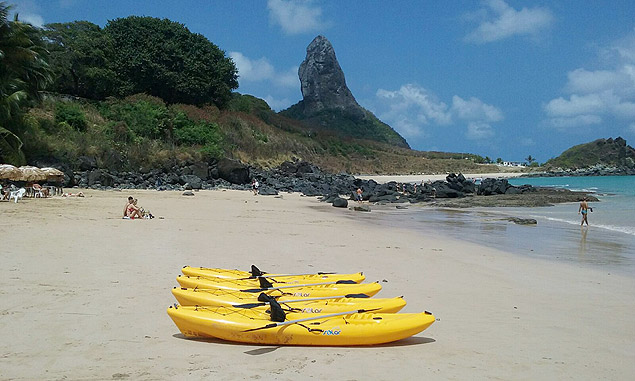Latest Photo Galleries
Brazilian Markets
16h39 Bovespa |
+0,44% | 127.088 |
16h43 Gold |
0,00% | 117 |
16h43 Dollar |
0,00% | 5,1151 |
16h30 Euro |
+0,49% | 2,65250 |
ADVERTISING
Holiday Island of Fernando de Noronha Registers First Shark Attack
12/23/2015 - 10h04
Advertising
VENCESLAU BORLINA FILHO
FROM CAMPINAS
A 33-year-old tourist from the state of Paraná had to have part of his right arm amputated following a shark attack on Monday afternoon (21), off the island of Fernando de Noronha, which belongs to the state of Pernambuco.
According to specialists and the local authorities, this is the first known shark attack in the history of the island.
The main hypothesis is that the man got too close to the shark. In addition, the water in the Sueste bay was murky at the time of the incident, which may have confused the animal.
The Sueste beach was closed, according to the Chico Mendes Biodiversity Institute (ICMBio), a federal government agency that looks after the island.
The tourist, who was on holiday with his wife, was snorkeling around 200 meters from the Sueste beach when he was attacked.
Sharks are common in the region, especially the nurse, lemon and tiger species. Unlike other tourist destinations such as Recife, at Fernando de Noronha the ecosystem is stable and well-balanced, and there is plenty of food for sharks, meaning attacks on humans are extremely rare.
The ecologist José Truda Palazzo Júnior, from Divers for Sharks, an international organization for shark preservation, says that he often swims with sharks in the Sueste bay, trying always to maintain a two-meter distance from the animals.
Palazzo Júnior says he is surprised by the news of the attack, given that sharks tend to avoid contact with humans.
The tourist, whose name was not published, underwent surgery in Recife, where he is currently recovering.
"The bite on the hand is very telling," says Rosângela Lessa, professor at the fishing and agriculture department at the Rural Federal University of Pernambuco. "It shows how close the man was to the animal."
The State Monitoring Committee of Shark Incidents (CEMIT) will investigate the case. "The water was a little murkier, it was getting dark and the shark may have attacked due to mistaken identity," says CEMIT president Clóvis Ramalho. He admits, however, that the tourist may have got too close to the shark.
Translated by TOM GATEHOUSE
Read the article in the original language
| Kleber Olinda/Divulgação | ||
 |
||
| Island of Fernando de Noronha |



